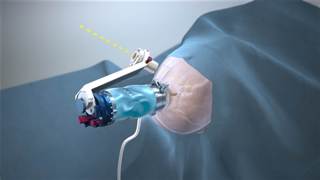Feb 4 2015
Mazor Robotics, a global leader in the development and distribution of innovative surgical guidance systems for spine and brain surgery, announced today the first transcerebellar brainstem biopsy, performed at the University Hospital of Tübingen in Germany, using its Renaissance® Guidance System.
 Renaissance brain animation
Renaissance brain animation
Affecting children exclusively, diffuse intrinsic pontine gliomas (DIPGs) are located in the brainstem and are the second most common malignancy of the brain in children. Until now, DIPG has remained incurable, with, according to literature, about 90% of children dying within two years of diagnosis. To develop effective new treatments on a molecular genetic basis, tissue samples are required. Brainstem biopsies are not standard and are very difficult to perform with standard equipment.
"The groundbreaking biopsy of a DIPG utilizing a posterior trans-cerebellar approach was enabled by Renaissance technology. It is practically impossible to perform this procedure with most standard systems," said Prof. Martin U. Schuhmann, the pediatric neurosurgeon who performed the surgery. He added, "The Renaissance® system makes it easily possible and we are convinced this approach is much safer for the patient. This can be a new venue to finding a more effective treatment for these children."
Prof. Schumann successfully operated on two patients suffering from DIPG, using transcerebellar Renaissance® guidance. The traditional superior approach is riskier due to the much longer trajectory passing through highly eloquent brain centers and increases the chances of complications and debilitating side effects. This is the major reason why brain stem biopsies are not standard in the treatment of DIPG.
"Performing a successful biopsy is the first step to finding a biological cure which scientists believe is the only chance to beat this terrible disease," saidOri Hadomi, CEO of Mazor Robotics.
"Mazor Robotics mission is to make a difference,"said Hadomi. "Our new technologies are disruptive; they challenge the status quo, but they improve patient care. This is what we are about."